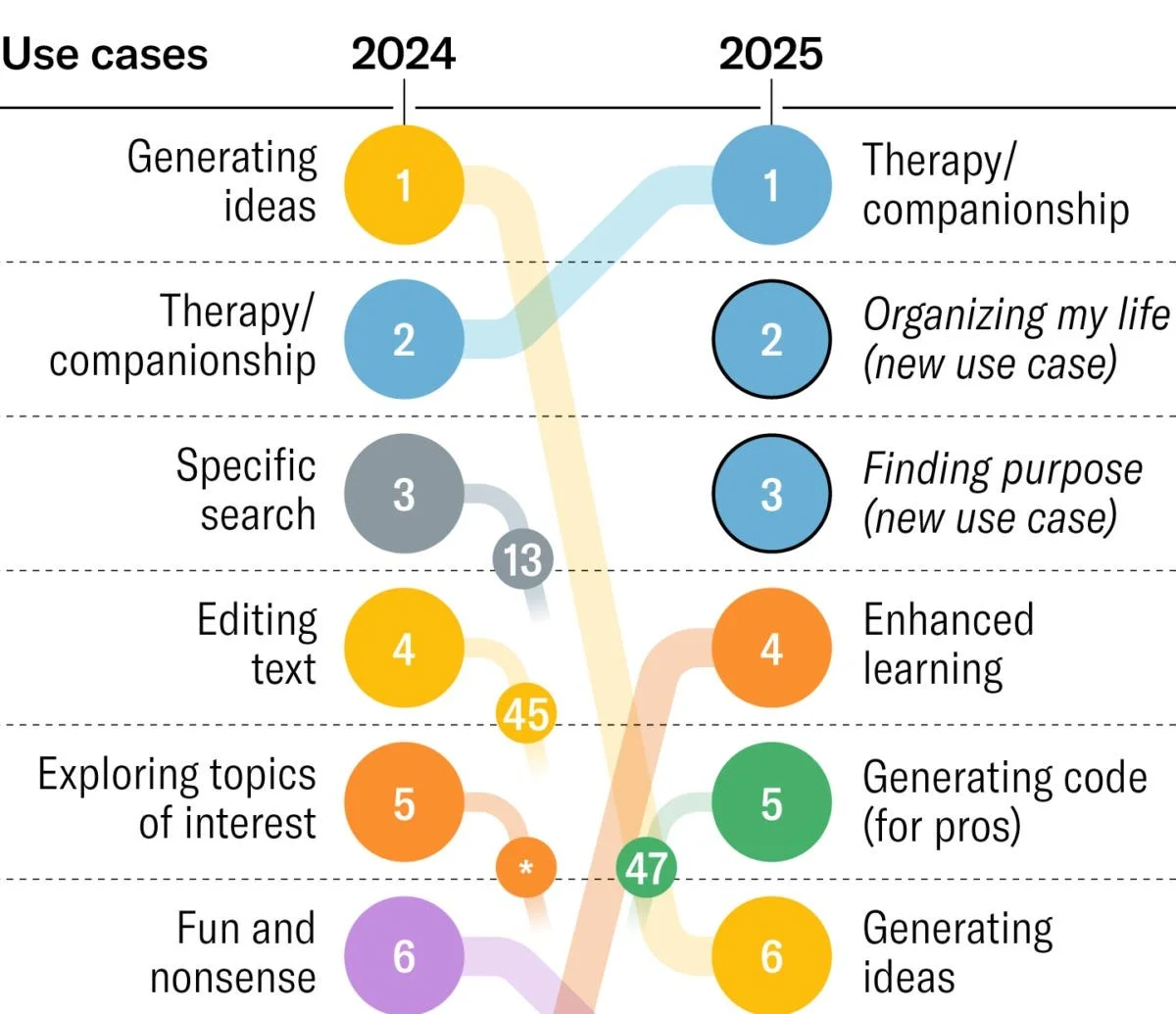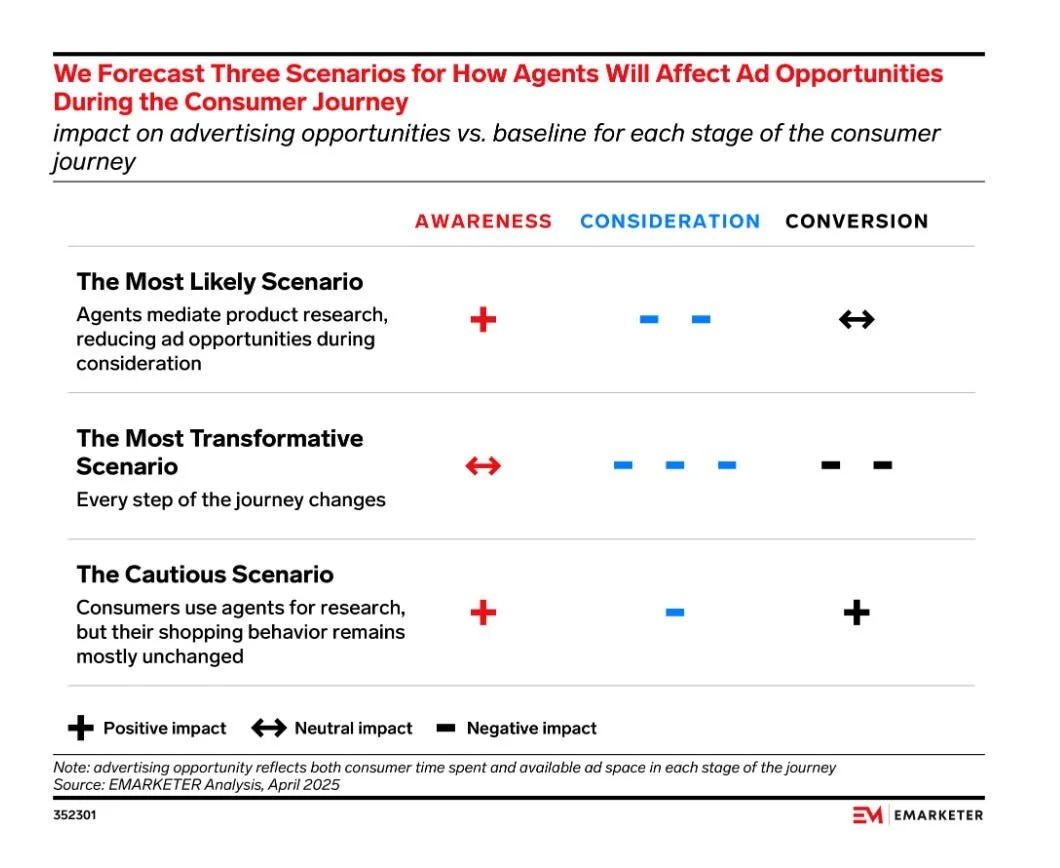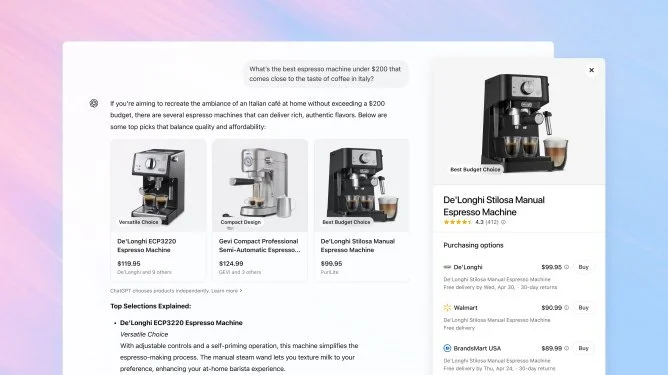I’m facing a bit of a time-crunch this week, but still wanted to send a newsletter out. Putting these together helps me to keep up to date with what’s happening in the world (at least my narrow slice of it). This week, I’m going to keep things simple and share a few recent links that relate to the question “how is AI impacting marketing?”
More people, especially Gen Z, are using Gen AI for personal and professional support.
Super interesting shift in how more people are relying on Gen AI for therapy and to help organize their lives. This is consistent with Sam Altman sharing that Gen Z’s “don’t really make life decisions without asking ChatGPT what they should do.”
This extends to purchase decisions, as AI agents are projected to be used for shopping tasks.
Buyers are increasingly delegating common decision-making tasks to Gen AI tools, such as creating or evaluating a product shortlist. This is disrupting the buying journey, as customers spend less time in the ‘messy middle’ of the funnel and purchase from what is recommended by the model.
Marketers need to reassess SEO plans as AI changes how consumers research online.
Given the influence of responses from Gen AI tools, marketers need to update SEO plans to consider (new buzzword incoming!) AISEO to be present in these results. Focusing more on rich, conversational text as well as ordered lists, definitions, and guides can help make your content more friendly to LLMs.
AI search reduces exposure to search ads, impacting how marketers spend ad dollars.
If consumers spend less time searching in this ‘messy middle’ phase, they will spend less time on Google exposed to paid search campaigns. eMarketer projects that AI assistants may lead to 40% fewer ad exposures during this consideration phase, would impact paid search media plans.
Some wonder if AI will weaken Google’s dominance in search and PPC marketing.
Apple exec Eddy Cue shared that he believes that AI-powered searches will be the new norm, replacing conventional search engines which caused shares of Alphabet to dip. There are reports that more marketers are now open to shifting budget from Google to new platforms, like retail media networks.
Google is embracing AI, and is possibly replacing “I’m Feeling Lucky” with AI Overviews.
Google is expanding its AI Overview feature to appear in more search results and may even replace the ubiquitous “I’m Feeling Lucky” button. Many publishers say AI Overviews reduce their organic traffic, but marketers report that paid search conversion-focused campaigns have not been significantly impacted.
AI platforms are moving in on Google’s turf, with plans to introduce ads and shopping tools.
Perplexity is reportedly building its own web browser (like Chrome) to track activity beyond its app and deliver “hyper personalized” ads (like Google). Meanwhile, ChatGPT is taking a different route—adding more product recommendations with images and links to buy, but without earning any affiliate commissions (for now).
AI is expected to dominate media buying as Meta and Google launch new tools.
AI buying agents are expected to handle over 80% of digital media buys within five years. Marketers will provide campaign parameters, and the platforms will take care of the rest. Google’s new AI Max for search is an example—it automatically finds relevant search queries beyond your existing keyword list.
Agencies are rethinking how to charge clients as AI changes media buy and creative production.
“If AI cuts 20% of the time it takes to manage our media, does that mean fees drop 20% too?” That’s the question Sir Martin Sorrell is raising, as he pushes agencies to move beyond billable hours and focus on charging for outcomes. As if it wasn’t already hard enough for agencies these days, Zuckerberg shared that the Meta ad platform is “gonna be able to come up with, like, 4,000 different versions of your creative and just test them and figure out which one works best.”
Marketing teams are using AI more than any other business function today.
McKinsey recently surveyed a number of senior folks from across different functions and industries and found that Gen AI use is highest in marketing and sales departments across all industry verticals.
Marketers are increasingly concerned that AI will replace jobs, and say more training is needed.
Marketing AI Institute just released its latest State of Marketing AI report, showing how marketer’s views on AI are changing year over year. This year, more people are worried about losing their jobs to AI. But one thing hasn’t changed — the biggest barrier to using AI is still a lack of training.
Speaking of training (see what I did there?), if you are interested in up-skilling your team in the area of AI in marketing, reach out. I’ve delivered a number of customized in-house corporate training programs over the last few years, and I’m happy to share my thoughts on what works (and what doesn’t!)
Finally…
If you don’t follow Mike Sutton on LinkedIn, you should. He’s sharing 12 lessons in leadership informed by his last 15 years as President at Zulu Alpha Kilo. Mike is what my father would call “a good egg”, and he’s posting some gems. Here’s my fav so far.



